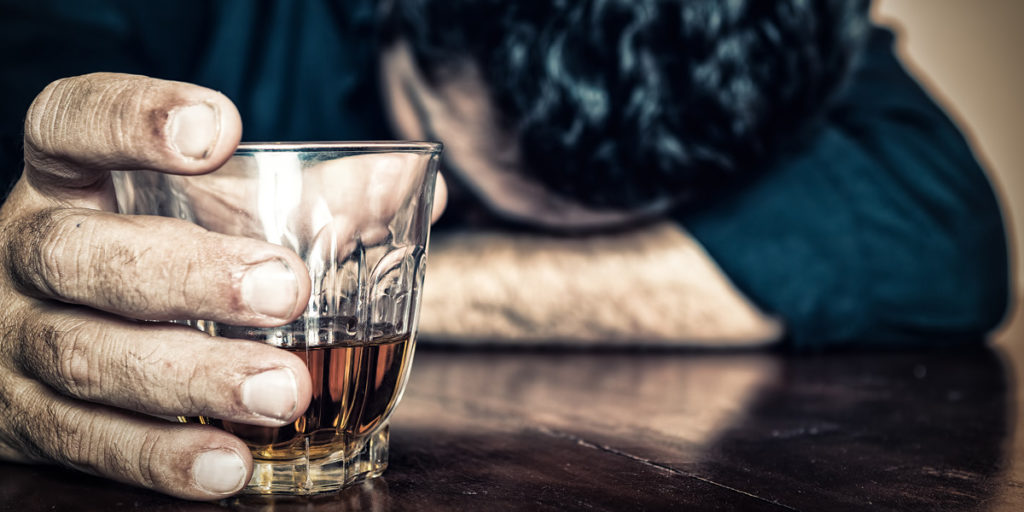Alcohol Poisoning: Symptoms and Causes

What Is Alcohol Poisoning?
Alcohol poisoning happens when there is so much alcohol in your bloodstream that certain parts of your brain controlling essential life-supporting functions— such as breathing, heart rate, and body temperature control start to shut down.
Alcohol poisoning deaths impact individuals of all ages but are most common with middle-aged men.
What Causes Alcohol Poisoning?
The cause of alcohol poisoning, reported by The Center for Disease Control and Prevention (CDC), is drinking large quantities of alcohol in a short period of time.
When you drink a lot rapidly, the concentration of alcohol in your blood becomes high enough to diminish areas of the brain responsible for consciousness and breathing. Consequently, you can fall into a coma, stop breathing and die.

Blood Alcohol Concentration (BAC)
Blood alcohol concentration (BAC) is the amount of alcohol that is present in your bloodstream. For instance, having a BAC of .10% means there is approximately one drop of alcohol for every 1,000 drops of blood in your body.
Alcohol overdoses occur when an individual has a BAC high enough to cause injuries that increase the chance of harm. When BAC reaches high levels, blackouts and loss of consciousness can happen. However, BAC continues to rise even after a person is unconscious.
Even after you stopped drinking, alcohol in the stomach keeps entering the bloodstream and spreads throughout the body, which can ultimately lead to alcohol poisoning. Therefore, it is dangerous and potentially life-threatening to think an unconscious person can just sleep it off.
Alcohol Poisoning Signs and Symptoms
If an individual is so drunk, they are not responsive or not breathing or showing any of the following signs of alcohol poisoning, get help immediately.
The signs and symptoms of alcohol poisoning can include:
- Blue lips
- Passing out and can’t be woken up
- Inability to remain conscious
- Cold and clammy hands and feet
- Slow breathing or fewer than eight breaths per minute spaced by ten or more seconds
- Hyperventilating
- Slow or no reflex response
- Seizures
- Slowed heart rate
- Trouble breathing

Alcohol Poisoning Deaths
According to the CDC, an average of 6 people die of alcohol poisoning each day in the U.S. Most who die are men, 35-64 years old, and identified alcoholism as a prevalent factor.
Like opioids, alcohol is a central nervous system depressant. Drinking alcohol depresses nerves in our body, responsible for controlling involuntary actions such as our gag reflex.
Additionally, alcohol irritates the stomach, usually causing vomiting. This combination could kill a person who drinks until they pass out. Without a functioning gag reflex, the risk of choking on vomit and dying is very high. And even if the individual survives, the lack of oxygen can lead to permanent brain damage.
Binge Drinking Puts You at Risk for Alcohol Poisoning
The dangers of alcohol poisoning increase the more you drink, creating a risky pattern.
Binge drinking is defined as four or more drinks for women or five or more drinks for men within two hours. This typically leads to a high blood alcohol level that increases the risk of adverse outcomes. Although, usually, adults who binge drink consume about eight drinks in two hours.
How Do You Treat Alcohol Poisoning?
If you suspect that someone has alcohol poisoning, seek out help right away.
Forcing a person to vomit does not help because the alcohol cannot be vomited if it has already passed the small intestines. Additionally, as stated above, because BAC can increase after a person passes out, never leave an individual unconscious or sleeping.
Other myths like cold showers, drinking black coffee, or walking it off could worsen things. It’s important to know that these measures will not reverse alcohol poisoning or sober a person up. The only thing that sobers a person up is time.

Act Quickly and Do Not Hesitate to Call 911
It is vitally important to call 911 without hesitation if you think someone might have alcohol poisoning. Letting it go untreated can have serious consequences resulting in brain damage, seizures, and death. Untreated severe dehydration from vomiting, on its own, can be fatal.
Doctors provide fluids at the hospital to reduce the BAC and combat dehydration and low blood sugar levels. They help manage any breathing problems and flush out the patient’s stomach to help clear toxins from the body.
Getting Help for a Drinking Problem
Alcohol overdoses are often related to alcohol use disorder or alcoholism. If you, a loved one, or someone you know is facing an alcohol addiction, Northridge Addiction Treatment Center can help. We aim to improve the quality of life for those troubled with alcohol abuse and mental health disorders.
To learn more about our scientifically proven treatment programs, call NATC to speak with our compassionate specialists today.
Find Meaningful Recovery
Our caring and compassionate specialists are eager to help you comfortably navigate this journey to recovery. Our individualized treatment plan, programs, and therapies may be a perfect match for you or your loved one. Let us assist you in living the happy life you deserve. It starts with a phone call.




